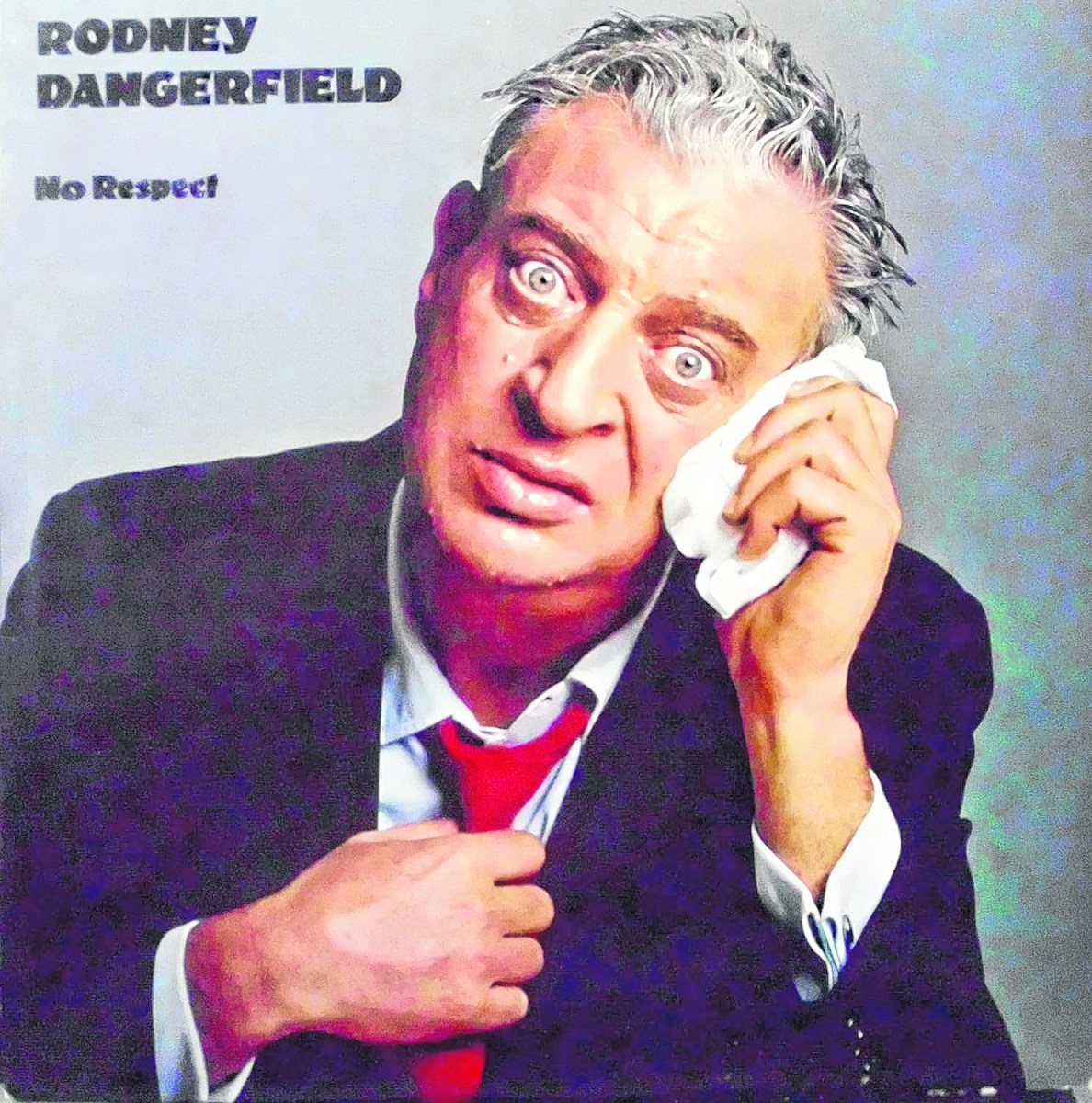He stands alone on a bare stage with only a spotlight as his companion, a disheveled, overweight, bug-eyed, dour-faced clown with a furrowed brow who constantly fidgets with the knot on his trademark crimson necktie as he goes through a litany of complaints about his lousy lot in life. He gripes about being physically ugly. He worries about his weight. He mines his marriage for material about his wife (a lousy cook and bad driver) and their sex life (or lack thereof), as an unruly crowd dares him to make them laugh.
With self-deprecating assured one-liners, he gets the audience in his corner, gambling on their sympathy and laughter by portraying himself as the ultimate failure who couldn’t get a break because — wait for it — as he laments, “I don’t get no respect.”
Later, he talked about his schtick. He said that people identified with him — “Everyone thinks they’re a loser in life” — explaining why his “respect” catch phrase worked to win over the crowds and make him an international comic icon.
This was Rodney Dangerfield at the top of his game. He knocked just about everyone and everything, including his Long Island hometown, Babylon: “The one thing about Babylon, the population never changes. Every time a kid is born, some guy leaves town.”
“WHEN I WAS A KID, MY PARENTS MOVED A LOT, BUT I ALWAYS FOUND THEM.”
Records of Dangerfield’s upbringing reveal the sadness of his early years. Jacob Rodney Cohen, the child of Hungarian Jews, was born in 1921 in an 18-room house owned by his Aunt Rose Goldberger at 44 Railroad Ave. in Babylon Village. His father, Phil Roy, was a juggling vaudevillian and comedian in the act billed as Roy and Arthur. Roy left the family shortly after Rodney’s birth, leaving his wife in poverty to raise two children alone. Rodney later described his mother as “overbearing,” a cold, unaffectionate woman who was subject to depression; her behavior caused her son to be depressed and his childhood to be a troubled one that “required regular visits to psychiatrists throughout his life,” as The New York Times described it.
There were some bright spots: Dangerfield later said he could still remember his aunt taking him for long, leisurely walks around Argyle Lake in Babylon Village.
The family moved to Queens when Dangerfield was 10. In school, according to Biography.com, he was tormented by antisemitic teachers and other students. He escaped by writing jokes for other comics and by age 19, had changed his name to Jack Roy and was performing full time as a singing waiter and comic at smaller clubs and the Catskills. But comedy didn’t pay the bills and his early attempts to make people laugh failed, so he quit gigging and went to work as a salesman in the early 1950s.
GETTING SOME RESPECT
He stayed away from comedy for 12 years, but the lure of applause was too powerful. He resumed performing in 1961, finding success this time as Rodney Dangerfield. Over the next few decades, he opened Dangerfield’s, a Manhattan nightspot that became a popular comedy club; was a frequent guest on late-night TV talk shows — including 70 times on The Tonight Show; and starred in hit comedy feature films such as Caddyshack. The actor with the New York accent earned his star on the Hollywood Walk of Fame in 2002 and wrote a national bestseller, It’s Not Easy Bein’ Me: A Lifetime of No Respect but Plenty of Sex and Drugs, published in 2004.
His wife Joan Child Dangerfield was later quoted in Newsday as saying that “he felt he was a regular guy.” It is ironic that this “regular guy” chose the grueling career of being a clown, considering that he was diagnosed as being clinically depressed
“MY FAN CLUB BROKE UP. THE GUY DIED.”
Dangerfield’s jokes often centered on his feeling rejected, unwanted, unpopular — and, of course, disrespected. But originally, he used a different mantra. As he later told critic Roger Ebert, he felt that nothing went right in his life, so in his act the funnyman would repeat, “Nothing goes right.” In 1969, the book The Godfather was published and he heard people talking about the concept of being respected. He also heard mob types at comedy clubs talking about respect. So he started using “I don’t get no respect” as a setup for jokes.
The next year, 1970, he got a hefty dose of respect in his hometown when he returned to headline the Town of Babylon’s Christmas tree lighting ceremony, and Babylon Town Supervisor Aaron Barnett proclaimed Dec. 13 to be “Rodney Dangerfield Day.”
Dangerfield died on Oct. 5, 2004 at age 82 in Los Angeles.




































